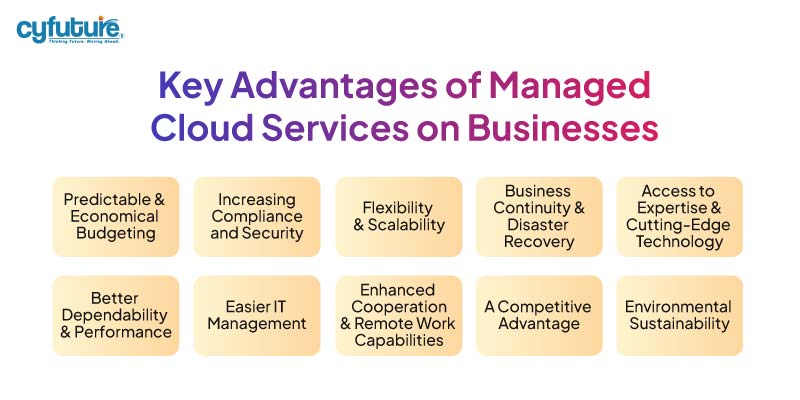Toggle navigation

Whether it is small and medium-sized companies or emerging startups, the cloud has become the backbone for the network infrastructures in several businesses. However, it is possible that you have already started your cloud journey, or you are ready to move your network to the cloud and incorporate cloud services and apps into your continuous business operations. Furthermore, keeping your cloud infrastructure and systems operating correctly while focusing on your core business may prove to be difficult for your organization.
Thus, one essential service requirement that businesses seek these days is managed cloud hosting services. According to the most recent report, the global market for managed cloud hosting services was estimated to be worth $46.50 billion in 2019. By 2027, it is expected to have grown at a compound annual growth rate (CAGR) of 13.8% and reach $129.26 billion.

With managed cloud hosting, all cloud administration responsibilities, including setup, monitoring, maintenance, and support, are managed by a different company. This allows businesses to focus on their core skills while leveraging the resources and knowledge of specialized cloud service providers. Businesses in India and across the world are swiftly adopting managed cloud services to get a competitive edge.
In this comprehensive blog piece, we’ll look at the revolutionary possibilities of managed cloud hosting and demonstrate how it may improve overall business performance, promote growth, and boost efficiency. We’ll look at the various benefits of managed cloud services, including improved security, cheaper costs, and disaster recovery.
After reading this article, you will have a comprehensive grasp of why managed cloud hosting is now a must for modern enterprises, rather than just a choice.

Its affordability is among the strongest arguments in favor of using managed cloud hosting. Hardware, software, and maintenance costs associated with traditional IT infrastructure are high. By way of a subscription model, managed cloud services, however, convert capital expenditures into ongoing costs. By making this change, firms may allocate resources more consistently and efficiently.
Additionally, scalable solutions are offered by managed cloud hosting companies, so you only pay for the resources you need. This flexibility keeps your business from over- or under-provisioning its IT resources by enabling it to adjust them in response to demand. Utilizing cloud infrastructure services helps businesses increase profitability while reducing the total cost of ownership.
For organizations, security is a major concern, particularly when handling confidential information. The data of their clients is safeguarded by managed cloud hosting companies, investing much in security measures. These businesses use cutting-edge security tools including intrusion detection systems, firewalls, encryption, and recurring security audits.
Moreover, industrial standards and legal compliance are guaranteed by managed cloud services. Businesses in industries with stringent regulations, including banking and healthcare, will greatly benefit from this. To make sure that their operations adhere to all the legal and regulatory requirements, cloud consulting services may assist firms in navigating the complicated compliance landscape.
The ability to grow operations quickly is essential in the fast-paced business environment of today. Because of the great scalability offered by cloud hosting, businesses may expand or reduce their IT staff in response to demand. Managed cloud services let you adjust your infrastructure in response to changing seasons or rapid expansion.
Businesses can innovate and swiftly adjust to changes in the market because of this scalability, which also applies to processing power, storage, and application deployment. Businesses in India that use cloud services may access a variety of resources without having to pay high upfront charges.
Disaster recovery is a crucial part of any business plan. With managed cloud hosting, you can ensure both the safety of your data and the continuous operation of your company in the event of an interruption. Managed cloud hosting provides complete disaster recovery options. Cloud service providers use redundancy and backup systems to reduce downtime and data loss.
Automatic backups, regional redundancy, and frequent data snapshots are advantages for businesses using managed cloud services. This ensures that your data is securely stored across many locations, enhancing business continuity and reducing the likelihood of catastrophic data loss.
A wealth of expertise and experience is brought to the table by managed cloud hosting providers. Expert teams with a focus on cloud computing, security, and IT management work for these firms. Through a partnership with a managed cloud service provider, businesses may have access to this experience without having to hire and train internal staff.
Access to the newest innovations and technologies is another benefit of managed cloud services. Cloud infrastructure services are always evolving, with providers updating their products to include new features and capabilities. This ensures that for your business to grow and stay competitive, it can take advantage of new technology.

A major component of every IT infrastructure is reliability and performance. Managed cloud hosting companies use modern data centers and infrastructure to deliver trustworthy and high-performance services. These providers ensure that your applications run swiftly and effectively by using redundant systems, load balancing, and optimal network configurations.
In addition, service level agreements (SLAs) that guarantee availability and performance metrics are part of managed cloud services. This suggests that businesses can rely on cloud service providers to deliver stable and consistent performance, reducing the likelihood of downtime and boosting overall efficiency.
Intuitively, maintaining an IT infrastructure may be challenging, too. Because the service provider assumes more responsibility, managed cloud hosting simplifies IT management. In contrast to the ongoing upkeep of IT systems, this allows businesses to focus on their primary operations and long-term objectives.
Everything from software updates and server upkeep to security monitoring and troubleshooting falls within the purview of managed cloud service providers. By using this comprehensive management approach, you can be sure that your IT infrastructure is safe, current, and operating at peak efficiency.
The necessity for trustworthy remote access and collaboration solutions has been brought to light by the surge in distant work. Managed cloud hosting makes it feasible to access cloud-based apps and data at any time, from any location. This promotes smooth cooperation. In today’s global corporate environment, teams are usually scattered throughout several places, therefore this is quite important.
A variety of collaboration capabilities, including file sharing, video conferencing, and project management apps, are offered by cloud services in India to encourage effective communication and teamwork. Productivity may rise overall for businesses that employ managed cloud services for remote work.
Possessing a technological edge might be crucial in a sector where competition is fierce. With managed cloud hosting, businesses may access resources and state-of-the-art technology that might promote development and innovation. By using cloud infrastructure services, businesses may develop and launch new apps, enhance customer experiences, and expedite processes.
Furthermore, cloud advisory services might help businesses find opportunities for digital transformation and put plans in place to gain a competitive advantage. By enhancing data analytics, customer relationship management, or the creation of new products, managed cloud services may contribute to the expansion of your company.
Sustainability is becoming more and more important to businesses all around the world. Because managed cloud hosting consumes less energy and requires less physical infrastructure, it contributes to environmental protection. Cloud service providers manage large-scale data centers powered by renewable energy and energy efficiency.
By using managed cloud services, businesses may reduce their carbon footprint and help create a more sustainable future. This benefits the environment in addition to enhancing your business’s brand and drawing in environmentally concerned stakeholders and clients.
Managed cloud hosting appears to have a bright future as technology progresses. It is anticipated that the potential applications for managed cloud services will grow with the introduction of new ideas like artificial intelligence (AI), machine learning, and the Internet of Things (IoT).
Businesses can now make decisions based on data thanks to AI and machine learning, which offer sophisticated analytics and predictive insights. Real-time device monitoring and management is made possible by the combination of managed cloud services and the Internet of Things (IoT), which boosts operational performance and creates new avenues for creativity.
Additionally, it is anticipated that managed cloud hosting will advance due to the increased focus on edge computing, which processes data near the data source. For applications that need to handle data in real time, like autonomous cars and smart cities, this paradigm significantly lowers latency and boosts performance.
In conclusion, managed cloud hosting offers businesses of all sizes significant advantages that enable them to stay competitive, safe, and adaptable in an increasingly digital world. The advantages are clear, whether it is in the form of budgeting’s cost and predictability, enhanced security and compliance, unparalleled scalability, or the ability to offer disaster recovery and business continuity. Through managed cloud services, companies may take advantage of cutting-edge technology, rely on knowledgeable management, enhance their capacity to work remotely, get a competitive edge, and support environmental sustainability.
Businesses may use cloud infrastructure and cloud consulting services to get around the challenges associated with implementing and improving cloud computing. Managed cloud services let companies concentrate on what they do best by leveraging the advanced technology and industry expertise of cloud service providers. Cloud services in India and throughout the world continue to be a vital part of modern organizations as the need for dependable and efficient IT infrastructure grows.
Take the next step in changing your company by investigating managed cloud hosting choices that meet your unique needs. Work together with reputable data center suppliers and managed cloud service experts to completely reap the benefits of cloud computing. It is now time to embrace managed cloud hosting as the way businesses will be creative and efficient in the future.
Get in touch with us right now to find out more about how our managed cloud services might support the expansion of your business.
A third-party business manages your cloud infrastructure as part of managed cloud hosting. This takes care of setup, monitoring, maintenance, and support, frng up enterprises to concentrate on their core business while utilizing expert cloud resource management.
Redundancy and backup solutions are employed by managed cloud hosting providers to minimize data loss and downtime. Your data is securely kept and recoverable thanks to automatic backups, regional redundancy, and monthly data snapshots, which enhances business continuity.
To keep up with the latest advancements in technology, managed cloud hosting firms do indeed often update their offerings. This ensures businesses can leverage innovative technology and solutions to grow and stay competitive.
In that, it uses less energy and requires less physical infrastructure, managed cloud hosting does contribute to environmental sustainability. To help businesses reduce their carbon footprint and promote sustainability, several cloud service providers provide energy-efficient data centers powered by renewable energy sources.
Certainly. Scalable solutions that may be tailored to small businesses and startups’ specific needs and financial constraints are offered by managed cloud services. Developing firms can benefit greatly from their services since they provide access to enterprise-level technology and knowledge without requiring a significant initial investment.